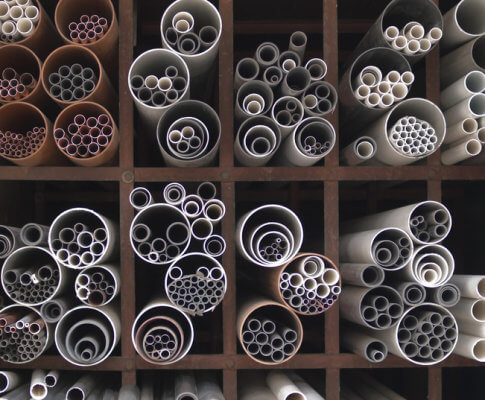Which Type of Plumbing Pipe is Best?
With so many different types of pipes, does it really matter which you use for your next plumbing project? You bet it does.
The best type of plumbing pipe depends on the application. Copper and polyvinyl chloride (PVC) are the most common pipes for basic residential plumbing, but there are additional options for various uses. Consider the pros and cons of each type when planning your plumbing project.

Copper Pipes
Pros of Copper Pipes
- Safe for drinking water
- Durable
- Less likely to leak
- Long life
- Recyclable
- Can withstand hot temperatures
Cons of Copper Pipes
- Expensive
- Can contain lead-based solder
Copper Pipes Are Best For
- Water supply
- Longevity – used for over 80 years with many original lines still in use
Polyvinyl Chloride or PVC Pipes
Pros of PVC Pipes
- Can withstand high water pressure
- Easy to work with across multiple applications
- Fairly inexpensive
- Long life – doesn’t corrode or rust
- Great for drainage
Cons of PVC Pipes
- Low heat tolerance – best for cold water
PVC Pipes Are Best For
- Indoor or underground applications – durable and affordable for home plumbing needs, but can warp or degrade when exposed to high temperatures or UV light.
Chlorinated Polyvinyl Chloride or CPVC Pipes
Pros of CPVC Pipes
- Safe for drinking water
- Easy to work with across multiple applications
- Best for cold or hot water
Cons of CPVC Pipes
- Not recyclable
- Can’t tolerate low or freezing temps
CPVC Pipes Are Best For
- DIYers – requires no special tools or skills
- Water supply
Cross Linked Polyethylene or PEX Pipes
Pros of PEX Pipes
- Very flexible
- Fairly inexpensive
- Long life
- Best for cold or hot water
Cons of PEX Pipes
- Uncertainty around possible water contamination
PEX Pipes Are Best For
- Tricky retrofits – flexibility allows PEX pipes to be snaked through walls
Galvanized Steel Pipes
Pros of Galvanized Steel Pipes
- Won’t corrode or rust (unless damaged and the zinc layer weakens)
- Fairly inexpensive
Cons of Galvanized Steel Pipes
- Extremely heavy
- Difficult to repair (usually replaced instead)
- Prone to clogging and inadequate water pressure over time
Galvanized Steel Pipes Are Best For
- Outdoor use – large construction and industrial projects
Polypropylene Pipes
Pros of Polypropylene Pipes
- Reliable and durable
- Can withstand high water pressure
- Fairly inexpensive
- Long life – doesn’t corrode or rust
Cons of Polypropylene Pipes
- Poor flexibility
- Installation requires specialty tools
Polypropylene Pipes Are Best For
- Water supply – ends are fused together using heat instead of chemicals
